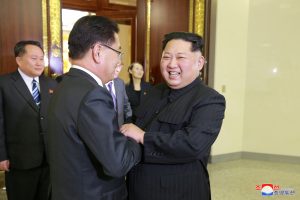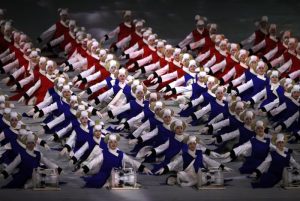
By Christine Kim
SEOUL (Reuters) – North Korea’s Kim Jong Un joked about his image in international media while serving South Korean officials local spirits and cold noodles during their unprecedented visit to Pyongyang this week, two South Korean government sources said.
During the meeting, Kim committed to giving up his nuclear weapons and told the South Korea officials he would like to meet U.S. President Donald Trump, delegation leader Chung Eui-yong told reporters at the White House on Thursday – a potentially dramatic breakthrough in nuclear tensions with Pyongyang.
Kim made light-hearted remarks about how he is viewed outside North Korea in international media and elsewhere, one Blue House official said. The officials who spoke asked to remain unnamed due to the sensitivity of the issue.
The North Korean leader, repeatedly derided as “Little Rocket Man” by Trump, was “very aware” of his image, the official said, and reacted to comments made about him in a “relaxed” manner by joking about himself from time to time.
South Korean officials say Trump and Kim now plan to meet by the end of May, in what would be the first ever meeting between a sitting U.S. President and a North Korean leader.
Tensions rose to their highest in years in 2017 following a battery of missile tests by North Korea, before a detente championed by South Korean President Moon Jae-In during his country’s hosting of the Winter Olympics began to bear fruit.
Kim told the visiting delegation Moon could rest easy at night now that Pyongyang had decided not to carry out nuclear or missile tests while talks were ongoing, a Blue House official said.
“President Moon has had a rough time chairing national security meetings at the break of dawn whenever we fired missiles,” Kim was cited as saying during a dinner meeting with the visiting South Koreans.
“If working-level talks ever cease and hostility appears, (President Moon) and I can easily resolve it with a phone call,” Kim referring to the hotline the two Koreas are planning to install to connect Kim and Moon. It will be the first such hotline to be set up between the heads of the two Koreas.
The Trump administration has warned all options are on the table, including military ones, in dealing with Pyongyang, which has pursued its weapons programs in defiance of ever tougher U.N. sanctions.
When the South Korean officials visited, no hard feelings were displayed and Kim Jong Un was the first to tackle sensitive topics, including the resumption of a military exercise between South Korea and the United States that was postponed for a peaceful Winter Olympics, the Blue House official said.
“This is when we knew the efforts of North and South Korea taken after the Moon Jae-in administration began had paid off,” said one participant of the North Korea visit.
Kim’s administration had also taken note of what North Korean foods the South Korean officials had mentioned while his sister Kim Yo Jong was visiting Seoul for the Pyeongchang Winter Olympics.
The delegation was served North Korean hotpot the first day and cold noodles – another regional specialty – the next, the Blue House official said.
Kim and the officials shared several bottles of wine, liquor made of ginseng and Pyongyang soju, the official said.
“The bottles kept coming,” said another administrative source who had official knowledge of the meeting.
The South Korean visitors to Pyongyang did not see one-on-one trackers that usually follow visitors in the North and were free to move about on the premises of the hotel, the first official added.
At the dinner on the first night, South Korean officials were able to observe the relationship between Kim and his wife, Ri Sol Ju, said the second administrative source.
The source said Kim did not come across as overbearing, describing the spouses as appearing “equal”.
“They seemed to be quite close to one another and he didn’t seem like one of your conservative husbands.”
(Reporting by Christine Kim; Editing by Lincoln Feast)










